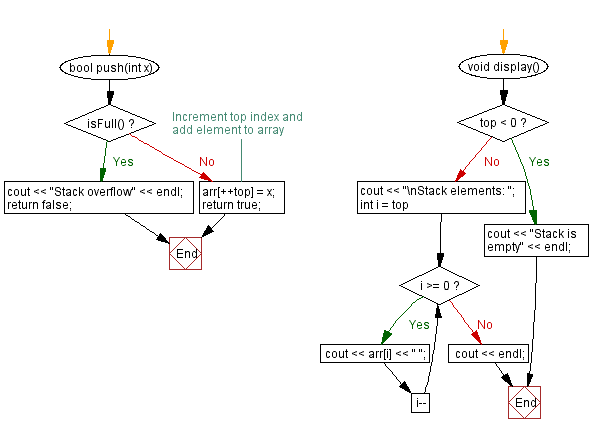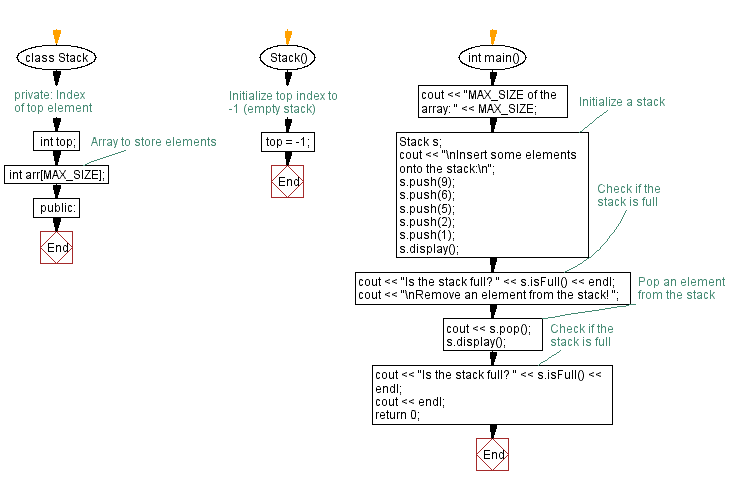C++ Stack Exercises: Check if the stack (using an array) is full
2. Check if the Array-Based Stack is Full
Write a C++ program to implement a stack using an array with push and pop operations. Check if the stack is full.
Test Data:
MAX_SIZE of the array: 5
Insert some elements onto the stack:
Stack elements: 1 2 5 6 9
Is the stack full? 1
Sample Solution:
C++ Code:
#include <iostream>
using namespace std;
#define MAX_SIZE 5 // Maximum size of stack
class Stack {
private:
int top; // Index of top element
int arr[MAX_SIZE]; // Array to store elements
public:
Stack() {
top = -1; // Initialize top index to -1 (empty stack)
}
bool push(int x) {
if (isFull()) {
cout << "Stack overflow" << endl; // Display message if stack is full
return false; // Return false to indicate failure in pushing element
}
arr[++top] = x; // Increment top index and add element to array
return true; // Return true to indicate successful element addition
}
int pop() {
if (isEmpty()) {
cout << "Stack underflow" << endl; // Display message if stack is empty
return 0; // Return 0 to indicate failure in popping element
}
return arr[top--]; // Return top element and decrement top index
}
int peek() {
if (isEmpty()) {
cout << "Stack is empty" << endl; // Display message if stack is empty
return 0; // Return 0 to indicate failure in peeking element
}
return arr[top]; // Return top element without modifying top index
}
bool isEmpty() {
return (top < 0); // Return true if stack is empty (top index is -1)
}
bool isFull() {
return (top >= MAX_SIZE - 1); // Return true if stack is full (top index is equal to MAX_SIZE - 1)
}
void display() {
if (top < 0) {
cout << "Stack is empty" << endl; // Display message if stack is empty
return;
}
cout << "\nStack elements: ";
for (int i = top; i >= 0; i--)
cout << arr[i] << " "; // Display elements of the stack
cout << endl;
}
};
int main() {
cout << "MAX_SIZE of the array: " << MAX_SIZE;
// Initialize a stack
Stack s;
cout << "\nInsert some elements onto the stack:\n";
s.push(9);
s.push(6);
s.push(5);
s.push(2);
s.push(1);
s.display(); // Display elements in the stack
cout << "Is the stack full? " << s.isFull() << endl; // Check if the stack is full
cout << "\nRemove an element from the stack! ";
cout << s.pop(); // Pop an element from the stack
s.display(); // Display elements in the stack
cout << "Is the stack full? " << s.isFull() << endl; // Check if the stack is full
cout << endl;
return 0;
}
Sample Output:
MAX_SIZE of the array: 5 Insert some elements onto the stack: Stack elements: 1 2 5 6 9 Is the stack full? 1 Remove an element from the stack! 1 Stack elements: 2 5 6 9 Is the stack full? 0
Flowchart:



For more Practice: Solve these Related Problems:
- Write a C++ program to implement a stack using an array and include functionality to detect a full stack before insertion.
- Develop a C++ program that simulates a fixed-size stack with an array and prints a warning message when a push is attempted on a full stack.
- Design a C++ program to build a stack with an array and verify its full status dynamically during successive push operations.
- Implement a C++ program to manage an array-based stack and check its full condition before each push, with clear output messages.
Go to:
PREV : Implement Stack using Array with Push, Pop, and Top Check.
NEXT : Sort a Stack Using an Array and an Auxiliary Stack.
CPP Code Editor:
Contribute your code and comments through Disqus.
What is the difficulty level of this exercise?
